How Argentina’s music prodigy transformed pain into purpose, shedding her childhood stardom to become a fearless voice in Latin pop.
Martina “Tini” Stoessel has lived many lives—teen idol, television darling, chart-topper—but none more honest than the one she lives today. Nearly a decade after she lit up screens across Latin America as the lead in Violetta, Tini has traded glittering Disney veneers for the raw authenticity of emotional rebirth. With her sixth studio album, Un Mechón de Pelo (“A Lock of Hair”), the 27-year-old artist finally sheds the final traces of her on-screen princess image and steps fully into her truth.
Back in 2012, Tini was the face of a global phenomenon. At just 14, she was thrust into the limelight as a singing, dancing lead in the Disney Channel Latin America series that became a cultural juggernaut. By the time Violetta ended in 2015, she had filmed more than 200 episodes, cultivated a massive fanbase, and felt a calling too loud to ignore. The next logical step? Her own voice, her own story—on her terms.
The road from teenage stardom to adult reinvention is notoriously treacherous, but Tini chose growth over nostalgia. Her early solo career sparkled with radio-friendly Latin pop hits, collaborations, and glossy visuals. But underneath the dazzle was a mounting struggle—a silent erosion of mental health that she worked tirelessly to mask. “Even I believed it,” she confesses on the haunting single “posta.” That illusion crumbled in 2024, not with scandal, but with Un Mechón de Pelo, a bold departure from her previous work.

This album doesn’t chase trends. It doesn’t chase charts. It chases truth. It’s sonically experimental and emotionally gutting—an unfiltered account of isolation, anxiety, and identity reckoning. Unlike past projects, this one features no collaborators. For Tini, the decision was deliberate: no one else could tell her story.
“These were not generic songs,” she explains. “They were about what was emotionally happening to me”
Opening up came with a cost. The internet can be cruel, especially when vulnerability defies the expectations of fame. Critics accused her of capitalizing on her mental health struggles. But for Tini, healing through music wasn’t a marketing tactic—it was survival. “The hardest part was admitting it to myself,” she shares. “I smiled in interviews while being absolutely devastated inside.” Her new mantra? Honesty over perfection. Presence over performance.

Despite the backlash, she’s not retreating. If anything, she’s reclaiming. Six months into her next record and preparing a career-spanning tour, Tini is pushing further into the freedom she’s fought to find. “I’m discovering who I really am and what kind of life I want to build,” she says. The upcoming Disney+ series Quebranto—her first TV role in a decade—signals not a return to the past but a reintroduction. This time, on her own terms.
In the larger narrative of Latin music’s global dominance, Tini’s evolution is a critical subplot. She’s more than a contributor—she’s proof that authenticity resonates across languages, borders, and platforms. “Music unites,” she says, “even the most unexpected people.” And in a landscape often obsessed with curated perfection, Tini’s imperfections are what make her unforgettable.


